the world online教案
译林版高一英语必修三 Unit 3 The world online L2 Reading 教案
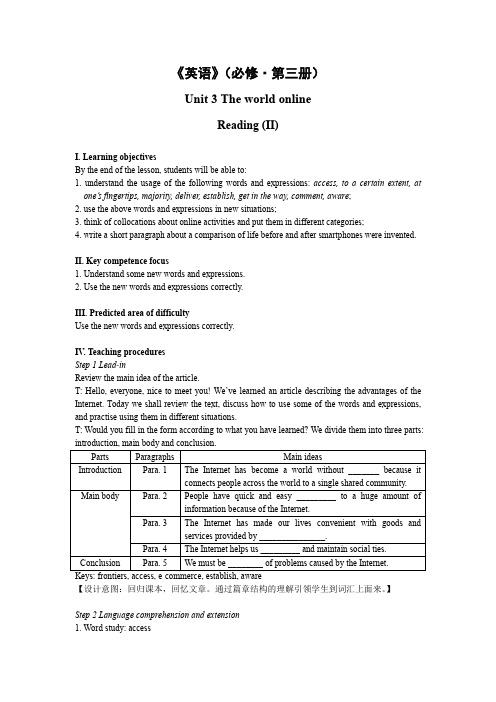
《英语》(必修·第三册)Unit 3 The world onlineReading (II)I. Learning objectivesBy the end of the lesson, students will be able to:1. understand the usage of the following words and expressions: access, to a certain extent, at one’s fingertips, majority, deliver, establish, get in the way, comment, aware;2. use the above words and expressions in new situations;3. think of collocations about online activities and put them in different categories;4. write a short paragraph about a comparison of life before and after smartphones were invented.II. Key competence focus1. Understand some new words and expressions.2. Use the new words and expressions correctly.III. Predicted area of difficultyUse the new words and expressions correctly.IV. Teaching proceduresStep 1 Lead-inReview the main idea of the article.T: Hello, everyone, nice to meet you! We’ve learned an article describing the advantages of the Internet. Today we shall review the text, discuss how to use some of the words and expressions, and practise using them in different situations.T: Would you fill in the form according to what you have learned? We divide them into three parts:【设计意图:回归课本,回忆文章。
新北师大版高中英语选修第一册教案
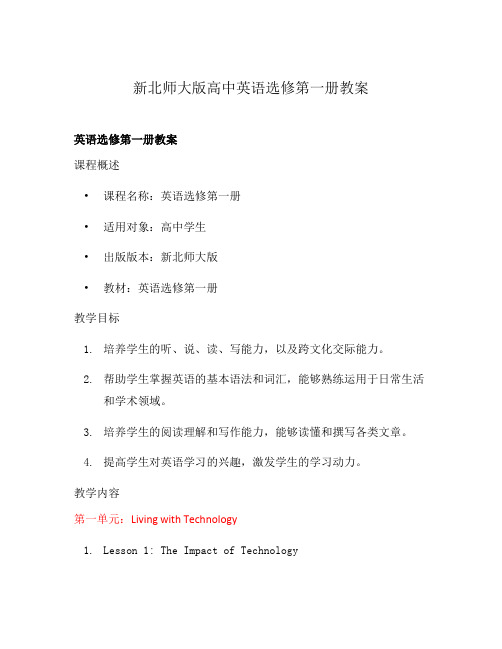
新北师大版高中英语选修第一册教案英语选修第一册教案课程概述•课程名称:英语选修第一册•适用对象:高中学生•出版版本:新北师大版•教材:英语选修第一册教学目标1.培养学生的听、说、读、写能力,以及跨文化交际能力。
2.帮助学生掌握英语的基本语法和词汇,能够熟练运用于日常生活和学术领域。
3.培养学生的阅读理解和写作能力,能够读懂和撰写各类文章。
4.提高学生对英语学习的兴趣,激发学生的学习动力。
教学内容第一单元:Living with Technology1.Lesson 1: The Impact of Technology–词汇学习:impact, explore, significant, potential, global, ethical–听力:听取关于科技对人类生活的影响的短对话,回答相关问题。
–视频:观看一段关于现代科技的视频,讨论其对社会发展的影响。
–阅读:阅读一篇文章,了解人工智能技术的发展与应用。
–语法:复习并掌握情态动词来表达推测和可能性。
–写作:撰写一篇关于人工智能的短文,探讨其利与弊。
–听力:再次听取关于科技的短对话,回答相关问题。
2.Lesson 2: The Online World–词汇学习:virtual, interact, chat, filter,moderation, cyberbullying–阅读:阅读一篇文章,了解网络世界的优劣。
–听力:听取与网络使用相关的讨论,回答相关问题。
–语法:学习并掌握条件句的用法,并运用于讨论网络使用的利弊。
–写作:写一篇关于网络使用的文章,讨论网络安全和个人隐私。
……第二单元:Media and Society……教学方法1.合作学习:鼓励学生在小组内合作学习和讨论课文内容,激发学生的思维和创造力。
2.多媒体教学:通过使用视频、录音等多媒体资源,增强学生对英语听力和口语的训练。
3.情景模拟:设计各种情景让学生进行角色扮演,提高他们的口语表达和跨文化交际能力。
译林版高中英语必修三Unit3 Extended reading 教案
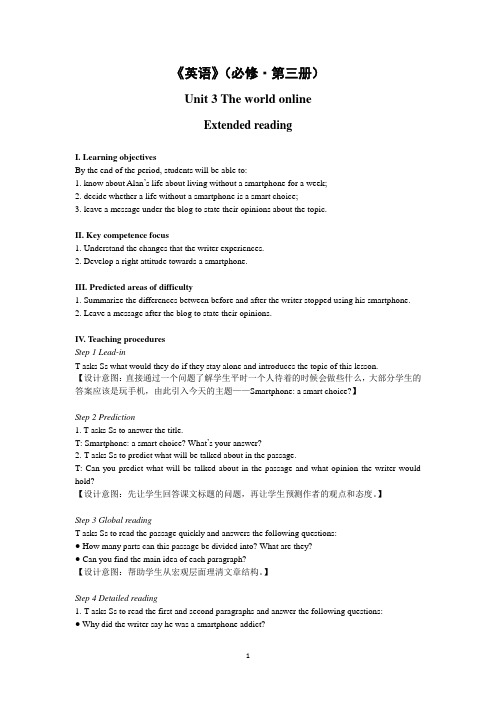
《英语》(必修·第三册)Unit 3 The world onlineExtended readingI. Learning objectivesBy the end of the period, students will be able to:1. know about Alan’s life about living without a smartphone for a week;2. decide whether a life without a smartphone is a smart choice;3. leave a message under the blog to state their opinions about the topic.II. Key competence focus1. Understand the changes that the writer experiences.2. Develop a right attitude towards a smartphone.III. Predicted areas of difficulty1. Summarize the differences between before and after the writer stopped using his smartphone.2. Leave a message after the blog to state their opinions.IV. Teaching proceduresStep 1 Lead-inT asks Ss what would they do if they stay alone and introduces the topic of this lesson.【设计意图:直接通过一个问题了解学生平时一个人待着的时候会做些什么,大部分学生的答案应该是玩手机,由此引入今天的主题——Smartphone: a smart choice?】Step 2 Prediction1. T asks Ss to answer the title.T: Smartphone: a smart choice? What’s your answer?2.T asks Ss to predict what will be talked about in the passage.T: Can you predict what will be talked about in the passage and what opinion the writer would hold?【设计意图:先让学生回答课文标题的问题,再让学生预测作者的观点和态度。
译林版高中英语必修三Unit3 Integrated skills (I) 教案
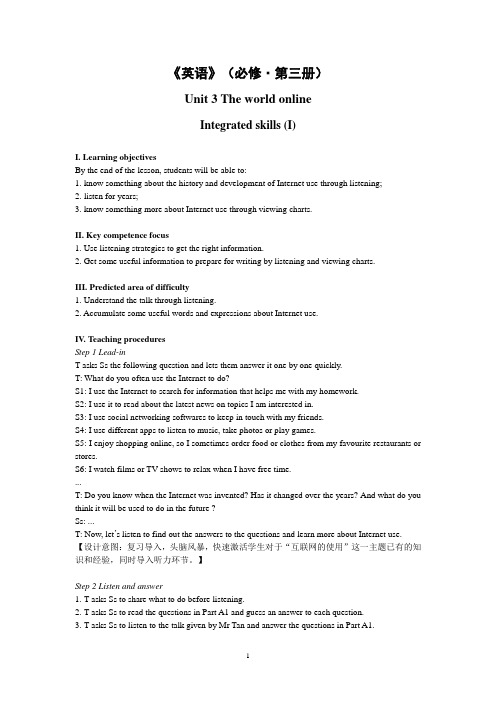
《英语》(必修·第三册)Unit 3 The world onlineIntegrated skills (I)I. Learning objectivesBy the end of the lesson, students will be able to:1.know something about the history and development of Internet use through listening;2.listen for years;3.know something more about Internet use through viewing charts.II. Key competence focus1. Use listening strategies to get the right information.2. Get some useful information to prepare for writing by listening and viewing charts.III. Predicted area of difficulty1. Understand the talk through listening.2. Accumulate some useful words and expressions about Internet use.IV. Teaching proceduresStep 1 Lead-inT asks Ss the following question and lets them answer it one by one quickly.T: What do you often use the Internet to do?S1: I use the Internet to search for information that helps me with my homework.S2: I use it to read about the latest news on topics I am interested in.S3: I use social networking softwares to keep in touch with my friends.S4: I use different apps to listen to music, take photos or play games.S5: I enjoy shopping online, so I sometimes order food or clothes from my favourite restaurants or stores.S6: I watch films or TV shows to relax when I have free time....T: Do you know when the Internet was invented? Has it changed over the years? And what do you think it will be used to do in the future ?Ss: ...T: Now, let’s listen to find out the answers to the questions and learn more about Internet use.【设计意图:复习导入,头脑风暴,快速激活学生对于“互联网的使用”这一主题已有的知识和经验,同时导入听力环节。
牛津译林版高中英语选修七Unit 3《The world online》(Reading2)教学设计
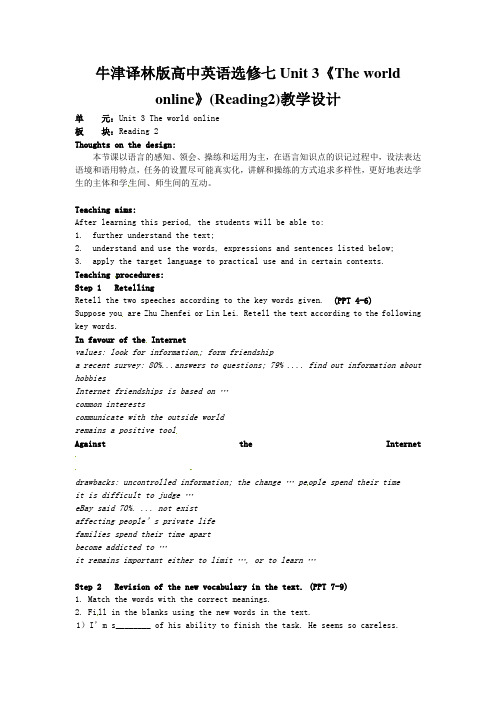
牛津译林版高中英语选修七Unit 3《The worldonline》(Reading2)教学设计单元:Unit 3 The world online板块:Reading 2Thoughts on the design:本节课以语言的感知、领会、操练和运用为主,在语言知识点的识记过程中,设法表达语境和语用特点,任务的设置尽可能真实化,讲解和操练的方式追求多样性,更好地表达学生的主体和学生间、师生间的互动。
Teaching aims:After learning this period, the students will be able to:1.further understand the text;2.understand and use the words, expressions and sentences listed below;3.apply the target language to practical use and in certain contexts.Teaching procedures:Step 1 RetellingRetell the two speeches according to the key words given. (PPT 4-6)Suppose you are Zhu Zhenfei or Lin Lei. Retell the text according to the followingkey words.In favour of the Internetvalues: look for information; form friendshipa recent survey: 80%...answers to questions; 79% ....find out information abouthobbiesInternet friendships is based on …common interestscommunicate with the outside worldremains a positive toolAgainst the Internetdrawbacks: uncontrolled information; the change … pe ople spend their timeit is difficult to judge …eBay said 70%. ... not existaffecting people’s private lifefamilies spend their time apartbecome addicted to …it remains important either to limit …, or to learn …Step 2 Revision of the new vocabulary in the text. (PPT 7-9)1. Match the words with the correct meanings.2. Fi ll in the blanks using the new words in the text.1)I’m s________ of his ability to finish the task. He seems so careless.2)One of the greatest d__________ of the Internet is that it sometimes provides false information.3)Could you give me the a__________ answer to this question?4) A ________ (私人的) car passed here and rushed the patient to the hospital. 5) Chinese arts have won the ___________ (赞扬) of a lot of people in the world. 6) This program is meant to help those who are _________ (上瘾) to smoking. 7) It suddenly o_______ to me that we went there by bike that day.8) For these reasons, I believe it has p______ effects on our lives instead of n___________ effects.Step 3 Language study1. Words and phrases (PTT 10-22)1)in need of 需要……•He expressed sincerely in his letter that he was in great need of my assistance.•那些玫瑰急需浇水。
牛津译林版选修七Unit 3《The world online》word教案

Unit 3 The world online教学设计Teaching Aims and requirements◆ Read two debates and an information sheet◆ Listen to speeches about how people watch and listen to the news◆ Talk about the Internet and ask questions about facts and figures◆ Write an e-mail reporting facts and figures◆ Do research on the Internet and design a posterTeaching ProceduresWelcome to the unitStep 1: BrainstormingWith the rapid development of Internet, it has been influencing our daily life tremendously. Internet has transformed our lives and the way we communicate, we learn, we work and spend our free time. In fact, it has more or less changed every aspect of human society.Boys and girls,please read the instructions and focus on the four pictures. Then try your best to think of information you know about each picture. Anyway, I’ll giveyou a brief introduction first. (For example, “We are going to talk about how we use the Internet. Try to find how we can use the Internet and how the Internet can affect our lives.”)Picture 1What can people do on this website?What do we call this kind of website that providessearching services? (We call it search engine.)Do you know how to find information on the internetusing a search engine?What search engines do you know or often use? Which is your favorite search engine?Picture 2Have you ever heard of shopping online or bought anything online? What is shopping online like?What do you think would be the advantages of buying things online? (As online shopkeepers do not have to pay for the rental of a real shop, the products sold on line are usually cheaper than those in real shops. It is easy and convenient to compare aproduct in several online shops. Paying for things issimple as you just key in the credit card number andconfirm the payment online. The delivery is usuallyquick and the online shops provide delivery to yourhome. The most important thing is that shopping onlinesaves a lot of time. )What do you think would be the disadvantages of online shopping?(Because people can only see pictures of the products online, sometimes you could receive something that was not what you really wanted. The safety of the payment is not one hundred percent guaranteed as someone may steal the account numbers or pin numbers of your credit cards registered online. Also, some people falsely advertise products and then steal customers’ money. )Picture 3Have you ever tried talking with your parents or friends online? What was it like?What devices do you need if you want to talk with peopleonline?(A computer connected to the Internet, a web-camera, aweb-microphone and web-talking software.)What are the good points and bad points of online talking?(There are many good things about online talking. People can savea lot of money instead of paying for long-distance calls. People cankeep in touch with family members or friends wherever they are inthe world. There are negative things too. The quality of the pictures or voice depends on the speed of the network transfer. Many people talk with online friends without realizing that their pictures could be used by others in illegal ways. )Which way of communication do you prefer, talking face to face, talking over the telephone, talking online or talking online with a web-camera? Why?Picture 4Have you tried other online services that are not mentionedhere? Which ones?What other online services do you think we will need or have in the future?What role do you think the Internet will play in the future?Do you think it is a good idea to “live” on the Internet completely?Step 2: Sharing information1. To work in groups of four or to form your own groups. Let’s read the three questions under the pictures.2. Exchange your opinions and discuss the three questions among your group members. I want all of you to fully participate in the discussion and express your opinions freely. Then some of you are required to report your answers to the class. Remember it may be more interesting for groups to exchange and compare your answers.Step 3: Discussion:What are the advantages and disadvantages of the Internet?Sample answersWith the rapid development of Internet, it has been influencing our daily life tremendously. Internet has transformed our lives and the way we communicate, how we learn, how we work and spend free time. In fact, it has more or less changed every aspect of human society.We can benefit a lot from Internet. Firstly, it is more convenient than ever before. Internet has greatly shortened the distance among human beings. E-mail is much more efficient. To do some research work, we can search for relevant information on Internet without leaving our home. Secondly, we can reduce our cost greatly. We needn’t spend lots of time and money in printing and posting. What we have to do now is just to send documents through Internet and it almost costs nothing.Although Internet has brought us many benefits, there can be no denying that it has brought us many inconveniences, even harms as well. First of all, it is not safe on Internet. Maybe thousands of people are staring at you when you log onto Internet. Your private information, such as your account and password, is easy to be let out. On the other hand, with the sharply increasing amount of time spent on Internet, we are starting to lose ourselves, especially for those youngsters. We are getting more and more indifferent to people around us. The more we communicate, the lonelier we feel.However, Internet itself is neither right nor wrong. We can benefit from it and may also suffer from it. Nobody can hold back the step forward of Internet. If we resisted it, we would certainly lag behind other nations. What we should do is to take full use of its advantages and try to avoid the harms it may bring as well.Step 4: Homework:1. Collect more information about the development of the Internet.2. Prepare the Reading part.Reading The effects of the Internet on our livesStep1: Lead-inNowadays, internet is playing an increasingly significant role in our society. Since its appearance, it has brought enormous changes to our lives. It seems that no one can escape from the influence of it. As to whether it is a blessing or a curse, there is a long-running controversial debate. Some people think that increased use of the Internet leads to social isolation and depression. People who spend more time on the Internet spend less time socializing with peers, communicate less within the family and fell more lonely and depressed.Have a discussion about the good and bad effects of the Internet in group. Try to fill in the table below:Step 2: Fast reading for general ideasGo through the passage as quickly as possible and try to find answers to the three questions in part A. Just focus on and identify the information needed to answer these questions.AnswersA 1 They are about different effects of the Internet on our lives.2 Two.3 Uncontrolled information and the change in the way people spend their time. Step 3: Detailed reading for important information1. Let’s read the passage a second time and complete Parts C1 and C2.2. Read the text again and choose the best answers according to the text:⑴According to the survey, children use the Internet mostly to __________.A. chatB. play gamesC. help with their studiesD. advance knowledge about hobbies⑵What is the most important thing in building a friendship?A. common interestsB. appearanceC. ageD. popularity⑶What is the worst problem of eBay?A. false informationB. people don’t know how to use a computerC. things selling on the Internet don’t existD. people are used to the traditional ways of buying⑷The clinic was opened to____________.A. help people surf the InternetB. be an Internet caféC. make people spend their time with their familyD. help people who are addicted to computer gamesNow, read the Reading strategy on page 35. Pay attention to how to read an argument, especially, how to find each side’s view, how to find a list of points, and what each side believes. Read the passage again and try to fill in the table below.Step 4: Practice:1. Now let’s complete Parts D on page 36.AnswersD 1 f 2 b 3 a 4 g 5 c 6 d 7 h 8 e2. A university student sent an e-mail to his mother. Read it in Part E and fill in the blanks with words given in the box.Step 5: Post-reading activities1. Pair work:What do you know about the Internet? Try to find as much information as you can, and report your information to your partner.2. Group work:Undoubtedly, in the future, the Internet will still play a very important role in human’s life. But they’ll certainly be advanced than those of today. Let’s work in groups and guess how we can use the Internet in the future. .3. Let’s come to Part F. Work in pairs and share your opinions with each other.4. Discussion: Does the Internet do us good or bad?Step 6: Language points:Step 7: Homework:1. Read the text again and again. Try to memorize the language points.2. Do Parts A1 and A2 on pages 118 of the Workbook.Word powerStep1: Brainstorming1. Guessing Game:At the beginning of today’s class, l et’s play a guessing game. Here are several cards, each of which is related to the Internet or a computer. I’d like one of you to give a brief description of the each device and other students to guess what it is.2. Next time you are in our school’s computer room, notice how we operate a computer.Step 2: Vocabulary learning1. Do you know about the operation of a computer and the knowledge of Internet? We’ll conduct a question-and-answer activity. Please speak out what you know as much as possible. The purpose of this activity is to make you more familiar with the words and terms connected to the Internet.2. Read Part A and make sure that you know what these words in blue mean or referto in Chinese.3. Focus on Part B and read the sentences individually first. Make sure that you know what these words mean or refer to in Chinese.4. Read the e-mail in Part C, which was written by Kenny to his grandpa about the Internet. You are required to complete the e-mail with the words discussed on page 38. Try to guess the meanings of the new words from the context. Then we’ll check the answers.Step 3: Vocabulary extension1. In Part D, you will learn some abbreviations that people use in Internet chat rooms. Whether you have used these abbreviations before? As the abbreviations use only the first letters of each word, it is fast to type them when chatting online. It is very popular among young people to use these words.2. You can sometimes work out what an Internet abbreviation stands for by reading the letters out loud, for example:B4 (before)OIC (oh, I see.)CUL8R (see you later.)I’ll explain some other expressions to you:BTW (by the way)BFN (bye for now)3. Complete Part D individually. Then we’ll check the answers.4. Reading:words: 288 time: 4’20’’The Internet began in the 1960s as a small network of academic and government computers primarily involved in research for the U.S. military. Originally limited to researchers at a handful of universities and government facilities, the Internet has quickly become a worldwide network providing users with information on a range of subjects and allowing them to purchase goods directly from companies via computer. By 1999, 84 million U.S. citizens had access to the Internet at home or work. More and more Americans are paying bills, shopping, ordering airline tickets, and purchasing stocks via computer over the Internet.Internet banking is also becoming increasingly popular. With lower overhead costs interms of staffing and office space, Internet banks are able to offer higher interest rates on deposits and charge lower rates on loans than traditional banks. “Brick and mortar" banks are increasingly offering online banking services via transactional websites to complement their traditional services. At present, 14 percent of Internet households conduct their banking by means of the Internet, and the figure is expected to double or triple during the next two or three years.Increasing commercial use of the Internet has heightened security and privacy concerns. With a credit or debit card, an Internet user can order almost anything from an Internet site and have it delivered to their home or office. Companies doing business over the Internet need sophisticated security measures to protect credit card, bank account, and social security numbers from unauthorized access as they pass across the Internet. Any organization that connects its networks to the global Internet must carefully control the access point to ensure that outsiders cannot disrupt the organization’s internal networks or gain unauthorized access to the organization’s computer systems and data.1. According to the text, Internet banking ________.A. requires minimal usage feesB. offers price advantages to usersC. is more efficient than traditional bankingD. is environmentally-conscious2. The term “brick and mortar banks” (Line 3, Para.2) refers to ________.A. banks with dependable reputationsB. banks with competitive interest ratesC. banks with traditional walk-in servicesD. banks with reliable on-line services3. The last sentence of the third paragraph tells us that ________.A. any organization's networks may be at risk of security breachesB. current technology cannot safeguard against unauthorized access to online networksC. information security should be a pressing concern for Internet commerceD. organizations must secure their networks and data against unauthorized use4. What is this text mainly about?A. Conveniences brought to consumers through use of the Internet.B. Implications of increasing commercial use of the Internet.C. Security risks posed by commercial use of the Internet.D. Advantages of Internet banking versus traditional banking.5. Which commercial usage of the Internet does the author NOT refer to?A. Buying airline tickets.B. Trading stocks.C. Applying for a credit card.D. Opening a bank account.Keys:1-5 BCDBCGrammar and UsageStep 1: General introductionThe grammar in this unit focuses on linking verbs. You’ll review what a linking verb’s function is in a sentence and what verbs can be used as linking verbs. You are expected to apply the rules you have learnt to complete some written tasks.Step 2: Exercises:Fill in the blanks with proper linking verbs:1. Wood ___ hard.2. The exercise ___ e asy, but in fact it’s very hard.3. Don’t you think the music of the song ___ beautiful?4. The old man ___ poor in the old days, but now he’s ___ rich on hare.5. Most leaves begin to ___yellow in autumn.6. The fish ___good; the children like it very much.7. The girl’s face ___red when she heard his words.8. It’s true ___ that parents ___ old when children grow up.Step 3: Explanation and practice:A linking verb is a word used to connect the subject of a sentence to further information about the state which the subject is in. The most common linking verb is “to be (be/am/is/are/was/were/been)”1. Let’s look at Part A on page 41. Please read the passage and underline all the linking verbs at the same time.2. Now, please turn to Part B on page 41. Please replace the underlined words with the words given in the box.For reference常用连系动词1. be1) She is a nurse. 她是一名护士。
(江苏专用)2021版新高考英语一轮复习Unit3Theworldonline教学案牛津译林版选修7

Unit 3 The world online三言两语1.Without smart phones,young peoplewould have few pleasures left inlife.2.Material collecting took us awhole week,during which weinterviewed our teachers and tookpictures of every aspect of schoollife.3.To start with,what I intend tostress is that we are about to startour next lesson in Classroom 8 ofthe Teaching Building at 10:00a.m.next Friday.1.努力工作,你就会过上幸福生活。
Work_hard,and you will live a happylife.2.我认为,重要的是我们要么限制使用因特网,要么学会如何解决它所引起的问题。
I feel it is important for us eitherto limit our use of the Internet,or to learn how to handle theproblems it has caused.[单词拼写应用]核心单词1.alarm vt.使担心,使害怕,使警觉n.警报(器);惊慌;闹钟2.false adj.虚假的,伪造的;错误的;人造的3.classify vt.分类,归类4.abandon vt.放弃;抛弃,舍弃5.command n.命令;控制;掌握vt.命令;指挥;控制6.correspond vi.通信;相一致,符合;相当于7.relevant adj.紧密相关的,切题的;有价值的,有意义的8.bother vi.&vt.花费时间、精力(做某事);打扰,给某人造成麻烦9.acknowledge vt.承认,认可;感谢10.correction n.改正,纠正,修正[语境运用] 用所给词的适当形式填空1.He acknowledged(acknowledge) publicly that he might have made a mistake.2.The new products which have been sent here will be classified(classify) in sorts.3.This house has long been abandoned(abandon).There is thick dust everywhere.4.The two people had corresponded(correspond) for many years before they met so they knew about each other very much.5.It's true that lots of people dislike being_bothered(bother) when they are absorbed in their work.6.I've made a few small corrections(correction) to your report.拓展单词1.accurate adj.准确的;精确的;精密的→accuracy n.准确性;精确度→accurately adv.准确无误地2.evaluate vt.评估,评价→evaluation n.评估,评价3.weak adj.虚弱的,不强壮的;软弱的→weakness n.缺点,不足;弱点;虚弱,衰弱→weaken vi.&vt.(使)变弱4.educate vt.教育→educator n.教育工作者,教师;教育(学)家→education n.教育5.refer vi.提及,参考,查阅→reference n.参考,查阅;提到,谈及;介绍信,介绍人6.invent vt.发明,创造→inventor n.发明者,发明家→invention n.发明,创造7.qualify vt.使合格,取得……资格→qualification n.资格,资历→qualified adj.有资格的[语境运用] 用所给词的适当形式填空1.Two thousand students were educated by the famous educator,many of whom received further education later. (educate)2.Previous experience is an essential qualification for the job,we welcome applications from suitably qualified individuals.(qualify)3.Apart from the textbooks,I often refer to other reference materials to assist my studies.(refer)4.Midterm examination is an evaluation of the basic capabilities and study,so you must take the exam to evaluate your learning performance. (evaluate) 5.Tell your doctor with the accuracy of the symptom so that he can give you the accurate treatment. If you are not treated accurately,you'll be in danger.(accurate)6.“Houses” have been the most popular area for inventions in the past andeven now. There you can also see some pictures of the inventors. (invent) 阅读单词1.source n.来源,信息源;根源,原因2.statistics n.(pl.)统计数字,统计数据,统计资料3.diverse adj.多种多样的,形形色色的4.avenue n.途径,手段;大街5.explicit adj.直言的,坦率的;清楚明白的,易懂的6.sample n.样本,样品vt.采样;尝试;品尝7.terminal n.终端,终端设备;终点adj.末端的,末梢的8.directory n.目录;电话号码薄;公司名录9.category n.类别,种类10.minus n.减号;负号;缺点prep.减;没有,缺乏adj.零度以下的;负数的11.outline n.提纲,概要;轮廓线;略图12.claim vt.宣称;断言;索取,认领n.声明;断言;索赔,索款1.(2019·全国卷Ⅰ)While the sun's rays can age and harm our skin,they also give us beneficial Vitamin D.变老;老化2.(2019·全国卷Ⅰ)In one study,Dr.Prinstein examined the two types of popularity in 235 adolescents,scoring the least liked,the most liked and the highest in status based on student surveys(调查研究).给……打分[短语多维应用]高频短语1.at__someone's_command受某人支配2.what_is_more 更有甚者,更为重要的是3.up_to_date 最新的;现代的;时髦的4.drop_out 退学,辍学;退出,脱离5.comb_(through)__someth[语境运用] 选用左边短语的适当形式填空Now in some rural schools,more andmore students ①drop_out ofschool.②What_is_more,some studentsare moving towards a life of crime. Infact,many reasons should③be_taken_into_consideration. Ithink the first important reason is1.without引导的介词短语表示虚拟条件Without the Internet,these peoplewould have fewer avenues to meetpeople.要是没有空气和水,就不会有生物。
《unit3 the world online》教学设计
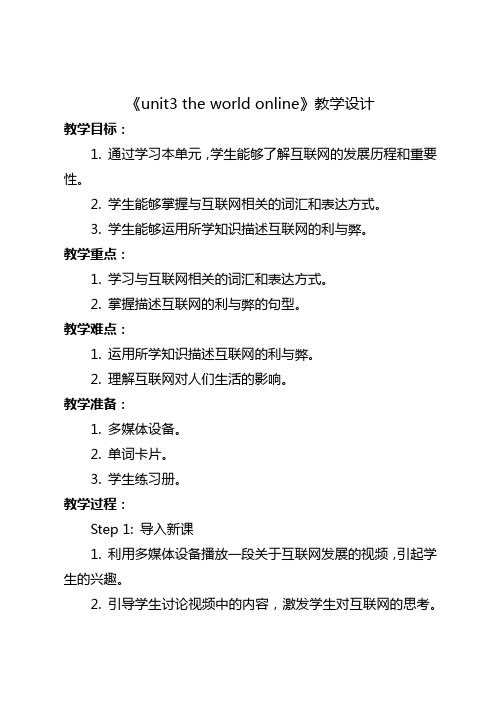
《unit3 the world online》教学设计教学目标:1. 通过学习本单元,学生能够了解互联网的发展历程和重要性。
2. 学生能够掌握与互联网相关的词汇和表达方式。
3. 学生能够运用所学知识描述互联网的利与弊。
教学重点:1. 学习与互联网相关的词汇和表达方式。
2. 掌握描述互联网的利与弊的句型。
教学难点:1. 运用所学知识描述互联网的利与弊。
2. 理解互联网对人们生活的影响。
教学准备:1. 多媒体设备。
2. 单词卡片。
3. 学生练习册。
教学过程:Step 1: 导入新课1. 利用多媒体设备播放一段关于互联网发展的视频,引起学生的兴趣。
2. 引导学生讨论视频中的内容,激发学生对互联网的思考。
Step 2: 学习新词汇1. 教师出示单词卡片,教授与互联网相关的词汇,如:internet, computer, email, social media等。
2. 学生跟读并记忆这些词汇。
Step 3: 学习句型1. 教师出示一些描述互联网利与弊的句子,如:The internet makes it easier for people to communicate.(互联网使人们更容易沟通。
)The internet can be addictive and harmful to our health.(互联网可能使人上瘾并对健康有害。
)2. 学生跟读并模仿这些句子。
Step 4: 练习对话1. 学生分成小组,进行对话练习,讨论互联网的利与弊。
2. 每个小组选出一名代表,向全班汇报他们的观点。
Step 5: 拓展活动1. 学生自由发挥,用所学知识写一篇关于互联网的短文,描述互联网对人们生活的影响。
2. 学生互相交换作文,进行修改和改进。
Step 6: 总结与评价1. 教师总结本节课的重点内容,并强调学生在日常生活中要注意合理使用互联网。
2. 教师对学生的表现进行评价,鼓励他们继续努力学习。
Step 7: 作业布置1. 布置练习册上与本单元相关的练习题。
Travellingaroundtheworld教案
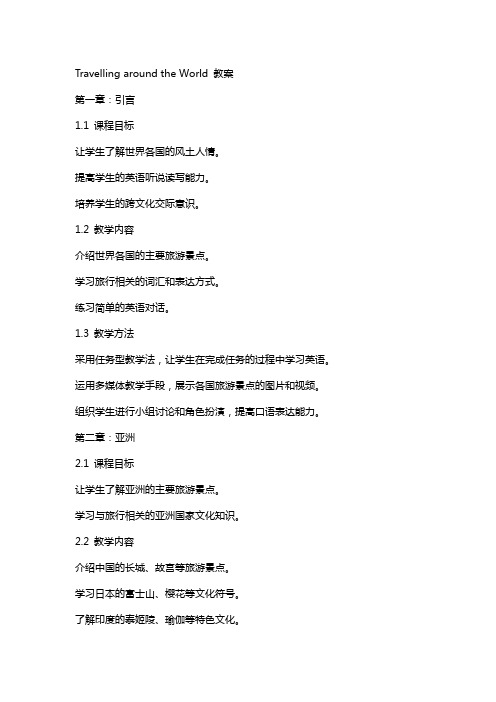
Travelling around the World 教案第一章:引言1.1 课程目标让学生了解世界各国的风土人情。
提高学生的英语听说读写能力。
培养学生的跨文化交际意识。
1.2 教学内容介绍世界各国的主要旅游景点。
学习旅行相关的词汇和表达方式。
练习简单的英语对话。
1.3 教学方法采用任务型教学法,让学生在完成任务的过程中学习英语。
运用多媒体教学手段,展示各国旅游景点的图片和视频。
组织学生进行小组讨论和角色扮演,提高口语表达能力。
第二章:亚洲2.1 课程目标让学生了解亚洲的主要旅游景点。
学习与旅行相关的亚洲国家文化知识。
2.2 教学内容介绍中国的长城、故宫等旅游景点。
学习日本的富士山、樱花等文化符号。
了解印度的泰姬陵、瑜伽等特色文化。
通过展示图片和视频,让学生直观地了解景点。
运用文化背景知识,引导学生了解亚洲国家的风土人情。
第三章:欧洲3.1 课程目标让学生了解欧洲的主要旅游景点。
学习与旅行相关的欧洲国家文化知识。
3.2 教学内容介绍法国的埃菲尔铁塔、卢浮宫等旅游景点。
学习英国的伦敦塔桥、大本钟等文化象征。
了解意大利的罗马斗兽场、比萨斜塔等特色建筑。
3.3 教学方法通过展示图片和视频,让学生直观地了解景点。
运用文化背景知识,引导学生了解欧洲国家的风土人情。
第四章:非洲4.1 课程目标让学生了解非洲的主要旅游景点。
学习与旅行相关的非洲国家文化知识。
4.2 教学内容介绍埃及的金字塔、狮身人面像等旅游景点。
学习南非的野生动物园、好望角等自然风光。
了解马里的人民大会、市场等特色文化。
通过展示图片和视频,让学生直观地了解景点。
运用文化背景知识,引导学生了解非洲国家的风土人情。
第五章:北美洲5.1 课程目标让学生了解北美洲的主要旅游景点。
学习与旅行相关的北美洲国家文化知识。
5.2 教学内容介绍美国的自由女神像、迪士尼乐园等旅游景点。
学习加拿大的尼亚加拉大瀑布、多伦多等自然风光。
了解墨西哥的玛雅古迹、海滩等特色文化。
《Travellingaroundtheworld》教案教学设计
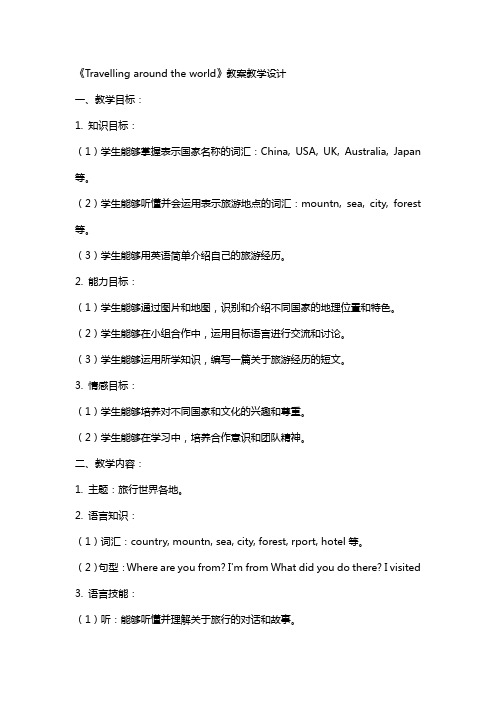
《Travelling around the world》教案教学设计一、教学目标:1. 知识目标:(1)学生能够掌握表示国家名称的词汇:China, USA, UK, Australia, Japan 等。
(2)学生能够听懂并会运用表示旅游地点的词汇:mountn, sea, city, forest 等。
(3)学生能够用英语简单介绍自己的旅游经历。
2. 能力目标:(1)学生能够通过图片和地图,识别和介绍不同国家的地理位置和特色。
(2)学生能够在小组合作中,运用目标语言进行交流和讨论。
(3)学生能够运用所学知识,编写一篇关于旅游经历的短文。
3. 情感目标:(1)学生能够培养对不同国家和文化的兴趣和尊重。
(2)学生能够在学习中,培养合作意识和团队精神。
二、教学内容:1. 主题:旅行世界各地。
2. 语言知识:(1)词汇:country, mountn, sea, city, forest, rport, hotel等。
(2)句型:Where are you from? I'm from What did you do there? I visited 3. 语言技能:(1)听:能够听懂并理解关于旅行的对话和故事。
(2)说:能够用英语介绍自己的旅游经历和所见所闻。
(3)读:能够阅读并理解关于旅行的文章和故事。
(4)写:能够运用所学知识,编写一篇关于旅游经历的短文。
三、教学重难点:1. 重点:掌握表示国家名称和旅游地点的词汇;能够用英语简单介绍自己的旅游经历。
2. 难点:能够运用所学知识,编写一篇关于旅游经历的短文。
四、教学方法:1. 任务型教学法:通过小组合作和任务完成,激发学生的学习兴趣和积极性。
2. 情境教学法:通过图片、地图和实物等,创设真实的学习情境,帮助学生理解和学习。
3. 交际法:通过角色扮演和小组讨论,培养学生的口语表达能力和交际能力。
五、教学过程:1. 热身(5分钟):(1)引导学生谈论自己的旅行经历,激活学生对旅行的兴趣和记忆。
高三英语the-world-online课件

see in the picture.But what does the picture try to tell us?
I guess the picture is trying to draw our attention to the worldwide problem of water shortage.
advance vt. 5._______
6.__________ appearance n. remain vi. 7.______ drawback n. 8.________ address vt. 9._______
10.accurate ________ adj. 精确的,准确的
11.advantage _________ n.
1.You’ll find this map of great________in
helping you to get round London.
A.price C.value B.cost D.usefulness
【解析】 句意为:你会发现这张地图在帮助你参观伦敦时很有帮助。
of great value 相当于very valuable,意为“很有价值”。 【答案】 C
要求:1.请描述图画内容,写出图片的寓意并发表自己的看法; 2.词数不少于120。 ___________________________________________________________ ___________________________________________________________
trees and doing whatever we can to protect the
environment.Only in this way will we have beautiful green leaves around us forever.
高中英语 Unit 3 The world online教案 牛津译林版选修7
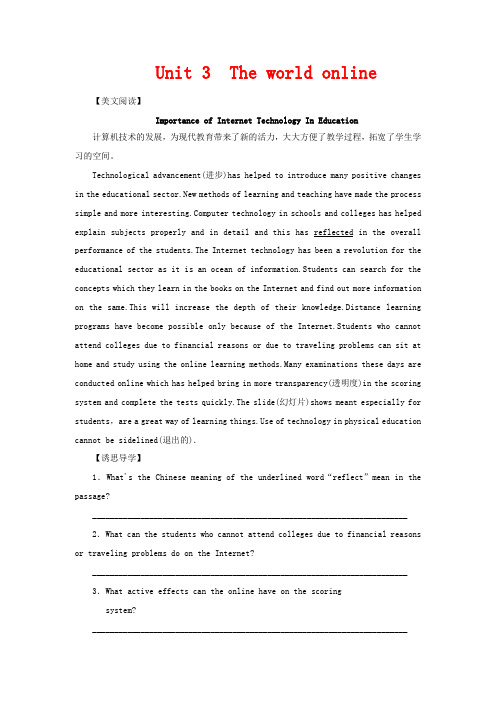
Unit 3 The world online 【美文阅读】Importance of Internet Technology In Education 计算机技术的发展,为现代教育带来了新的活力,大大方便了教学过程,拓宽了学生学习的空间。
Technological advancement(进步)has helped to introduce many positive changes in the educational sector.New methods of learning and teaching have made the process simple and more puter technology in schools and colleges has helped explain subjects properly and in detail and this has reflected in the overall performance of the students.The Internet technology has been a revolution for the educational sector as it is an ocean of information.Students can search for the concepts which they learn in the books on the Internet and find out more information on the same.This will increase the depth of their knowledge.Distance learning programs have become possible only because of the Internet.Students who cannot attend colleges due to financial reasons or due to traveling problems can sit at home and study using the online learning methods.Many examinations these days are conducted online which has helped bring in more transparency(透明度)in the scoring system and complete the tests quickly.The slide(幻灯片)shows meant especially for students,are a great way of learning e of technology in physical education cannot be sidelined(退出的).【诱思导学】1.What's the Chinese meaning of the underlined word“reflect”mean in the passage?________________________________________________________________________ 2.What can the students who cannot attend colleges due to financial reasons or traveling problems do on the Internet?________________________________________________________________________ 3.What active effects can the online have on the scoringsystem?________________________________________________________________________【答案】 1.The word “reflect” means“反映”in Chinese here.2.They can sit at home and study the college courses using the online learning methods.3.Many examinations these days are conducted online which has helped bring in more transparency(透明度)in the scoring system and complete the tests quickly.Period ⅠPreviewing(教师用书独具)●教学目标本课时主要是通过学生对学案所给出的内容的学习,了解本课文中所出现的词汇,初步了解课文以及相关的背景知识,对下一堂课对课文的全面理解起到一个铺垫作用。
- 1、下载文档前请自行甄别文档内容的完整性,平台不提供额外的编辑、内容补充、找答案等附加服务。
- 2、"仅部分预览"的文档,不可在线预览部分如存在完整性等问题,可反馈申请退款(可完整预览的文档不适用该条件!)。
- 3、如文档侵犯您的权益,请联系客服反馈,我们会尽快为您处理(人工客服工作时间:9:00-18:30)。
Teaching designUnit 3 The world onlineWord power The InternetTeaching objectives1. Knowledge objectives:Enlarge students’vocabulary related to the Internet such as “browse, refresh, search engine” etc.2. Ability objectives:1) Students are expected to expand their vocabulary as well as to put them into practice.2) Students ’ ability of cooperation with other students are expected to be improved during the activities. .3. Moral objectives:Students are expected to become familiar with the operation of the Internet and show interest in this new technologyTeaching important pointsHelp students remember and understand some Internet words.Teaching difficult points1) How to help students enlarge their vocabulary and put them into practice efficiently .2) How to arouse students’ interest in learning more about the Internet. Teaching methodsCommunicative approach , Task-based language teaching, competition, etc . Teaching aidsMulti-media computer , blackboardTeaching proceduresStep 1 GreetingsStep 2 BrainstormingHow many words can you think of related to the computer?(Ask students to give as many words as they can. )Step 3 Vocabulary learning1.Show a picture of a web page and make sure students know the buttons or icons onit and their functions.2. PracticeGet students to fill the blanks without looking at their books to check whether they have remembered all the words listed in Part A.1) When you _________ for something, you are looking for specific information.2) You can click the button of _____________ to return to the previous page.3) When you’re looking at information without a specific goal, you’re__________.4) When you find something on the Internet that you want to save, you can __________ it onto your computer.5) When you want to bring a page to full size, click the ___________ icon.6) If you have something you want to publish on the Internet, you can __________ it from your computer.7) When you finish viewing a page, you can click the ______ icon at the top right hand corner to exit the page.8) When the web page has a problem, you can click on the __________ button and the page may appear again without a problem.9) If you want to stop viewing a page, but you might want to come back to it later, click the ________ icon and the name of the page will stay at the bottom of your screen.Answers:1)search 2)back arrow 3)browsing 4)download 5)maximize6)upload 7)close 8)refresh 9)minimize3.Ask students to focus on Part B and show more information about the words related to the Internet.Step 4 Vocabulary usingAllow students two or three minutes to deal with Part C on Page 39 to consolidate the use of the vocabulary learnt in Parts A and B.Step 5 Vocabulary extension1.Show a picture of Kenny and her grandpa’s chatting contents including a lot ofabbreviations. Ask students to guess the meaning according to the context.2.Ask students whether they have ever used some abbreviations that people oftenuse in Internet chat room. Get students to guess the meaning of some abbreviations.B4 _________ PLZ _________ ?4U _________OIC _________ JK __________ Sry _________CUL8R _________ VS _________ IDC __________BFN _________ ME2 _________ Y __________VIP _________ 4EVER _________ DIY __________ Answers:before; Oh, I see; See you later; bye for now; very important person; please; just kidding; versus; me too; forever; question for you; sorry; I don’t care; why; do it by yourself.3.Allow students30 seconds to complete Part D on Page 39. Get them to write the correct abbreviation in the blanks. Then check the answers together.Step 6 Competition“Describe and guess”Divide the class into two groups. One or two students in each group volunteer to stand in front of the class to guess the words on the screen according to other students’description. The group guess the most will be the winner.Step 7 SummaryStep 8 Homework1. Memorize the words in word power.2. Surf the Internet and find more words related to the Internet.3. Translate the sentences on the screen.Step 9 Blackboard designIn the middle of the blackboard, draw a chart to show the words related to computer, and some relevant vocabulary on the right side of the blackboard.。
